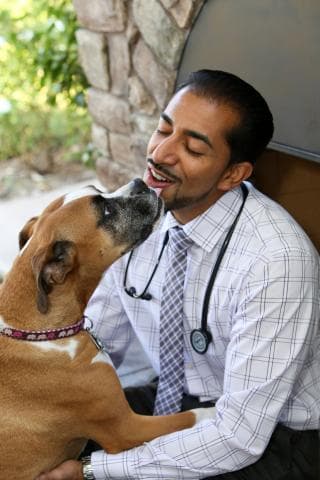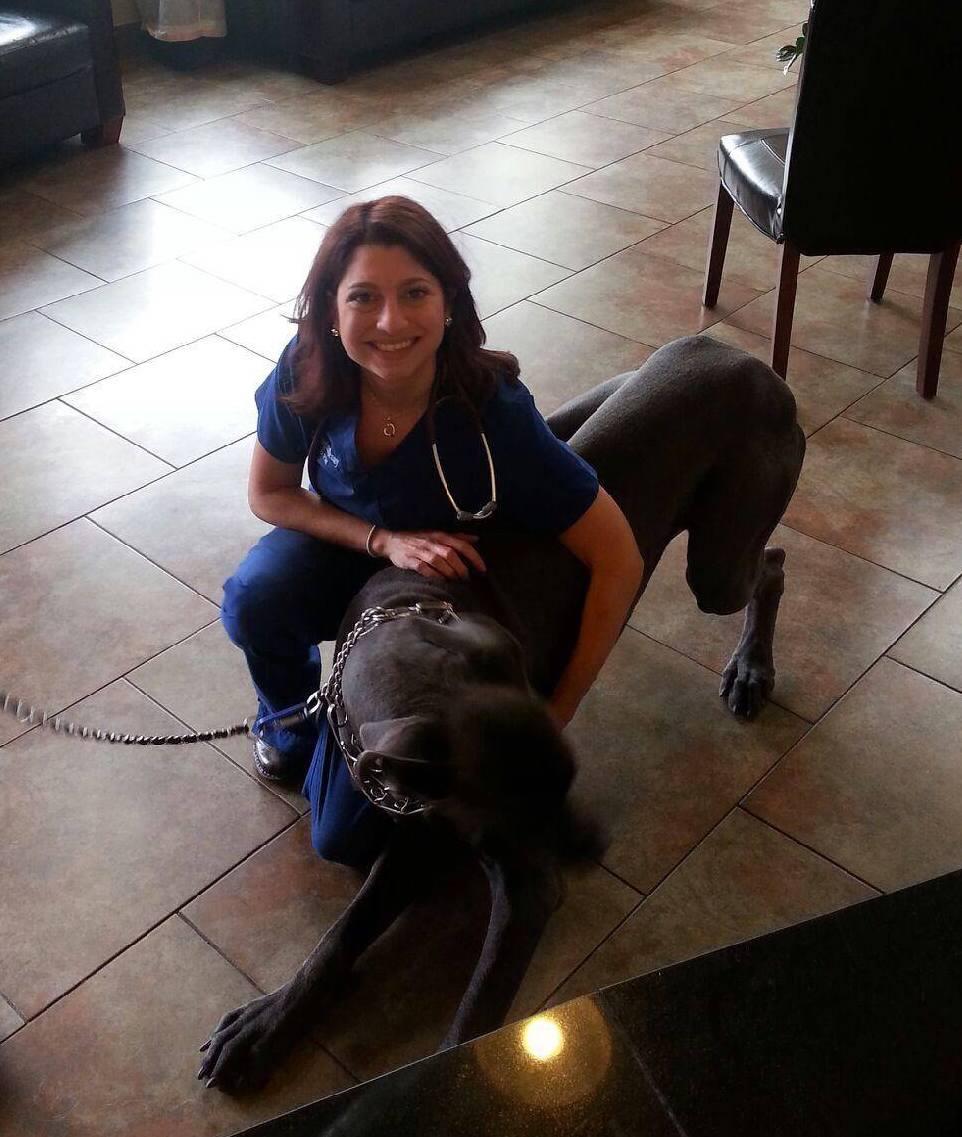Dog Wellness Exam FAQs Answered by Veterinarians
How Regular Dog Wellness Exams Improve the Life Of Your Dog
Regular dog wellness exams can improve the length and quality of your pet's life, so it's no wonder that, as a responsible pet parent, you have questions. At GeniusVets, we believe that pet care information should come from veterinarians and not from Dr. Google, as anyone with a computer can share information these days. That’s why we’ve taken frequently asked questions on dog wellness exams, sent these questions to renowned veterinarians across the U.S., and compiled their replies to get you useful information that you can trust.
While we've sourced all of the dog wellness exam information and recommendations below directly from leading veterinarians across the country, please make sure to seek out the advice of your own veterinarian or find a trusted vet near you using the GeniusVets Directory.
What is involved in a dog wellness exam?
A dog wellness exam is a nose-to-tail exam we do every six months on dogs during which we do a thorough musculoskeletal exam, eye and ear exam, look in their mouths, feel their abdomen, check their lymph nodes and skin, look under the tail, weigh them, get their body temperature, and check their paws. We’ll also discuss any issues that you may be having and talk about your dog’s lifestyle.
How does dog wellness impact the longevity of my pet?
Longevity is an interesting word because our primary goal is the quality of life for the dog. Essentially, wellness exams are generally meant to be on healthy pets, but it's incredible how many times we find underlying issues because pets hide these issues so well. Dogs will often pretend that they're fine, or they might be hiding something under the surface. During an exam, we should hopefully pick that up and diagnose a problem sooner rather than later. And if we can help that dog earlier on in the disease, we're going to help that dog live longer. As veterinarians, we stress prevention and also hope to diagnose any issues early on before they progress. We take the saying “an ounce of prevention is worth a pound of cure” to heart.
How soon should I bring my dog in to see a veterinarian for a wellness exam?
We recommend an exam immediately after getting your pet, whether it's a puppy or an adult dog. That way, we can start documentation on your pet and plan how often we need to see them from there, depending on their age, health, and lifestyle. A puppy's going to need to come in much more frequently than a three-year-old dog. In general, we recommend bi-annual wellness exams. Remember, dogs age more quickly than people, and like people, they can't voice if they're feeling unwell.
The AAHA has guidelines about dog wellness exams based on the dog's life stage.
Will additional testing be needed beyond a wellness exam?
That will depend on your exam and your pet's age and lifestyle.
Generally, some preventative care tests could include:
How will a veterinarian assess dog wellness?
What may be normal for your dog may be different for another dog, so we’re assessing their baseline— what's normal for them and what's expected for them. We know certain things should be happening, so we’re looking for growth on a puppy, and then we’re looking for things that we can compare to later. There are many situations where we get some blood work, which seems to be a bit abnormal. As veterinarians, we don't know if we should be worried about it, but if we’ve had blood work since they were young, we could say, "Well, that's this dog's normal." In other words, it's something we don't need to worry about and spend a lot of time on.
During the examination, we use various instruments—the otoscope to look in the ear, the ophthalmoscope to look in the eye, and the stethoscope to listen to the heart and lungs. We take temperatures. We conduct range of motion exercises to test the musculoskeletal system and neurologic system. We’re also trained to look for things like lymph node enlargement and dental disease.
We want to have our hands on dogs for wellness exams instead of a phone call or telehealth option because the dog can't talk and tell us if anything is wrong. And if we find something amiss with your dog, we immediately make a treatment plan for the issue.
What are some dog wellness recommendations my vet is likely to make?
As with everything, our wellness recommendations will depend on the dog. We're going to discuss diet, including the type of food that they're eating. Is the dog getting too much or not enough food? Weight recommendations will be significant; ensuring your dog is at a proper weight, and a good body score is essential.
If it's an adult dog, we will do an annual heartworm test and stool check for internal parasites. We’ll recommend routine dental screening, vaccinations, preventative care, bloodwork, or X-rays, depending on your pet's age. We also want all dogs on flea and tick control, as there are many diseases you can get from fleas, ticks, and heartworms. There are certain vaccines that we consider core for wellness. There are also some non-core vaccines that we may recommend, depending on lifestyle.
Dental health is also essential, especially for our pets, as they're not brushing their teeth twice a day, and they're not flossing. Hopefully, you’ve been doing some home dental care, but there is much more that we have to consider for them.
And then, of course, we will discuss things like how to monitor for changes or problems in your dog. How do you know when something's going wrong?
What are some possible environmental factors that can affect dog wellness?
Many behavior concerns come down to what happens in the home and how the dog's treated, so that would be one. We’ll also want to discuss the safety of things in the house, outside of the house, and whether they can get into toxins, foreign bodies, etc.
Obesity is also another factor that we can consider environmental, as pet owners can quite frankly kill their dogs with what they think is kindness (treats!). We can control the dog's nutritional intake, but many times they're begging with what we all know as puppy dog eyes. Many pet owners overfeed their dogs. Essentially, the dog’s home environment can affect their body condition score or if they're overweight or underweight.
A dog’s coat is another thing that falls under environmental factors. It takes a lot of care to do grooming in certain breeds. A dog’s hair coat is going to be dependent on how you care for them at home too.
Seasonal changes are another big consideration, as dogs can suffer from allergies. During the summer, we see a lot of heatstroke and foxtail or grass awns. And depending on where you live, we may see more heartworms during the mosquito season. If your weather is warm year-round, fleas can be a huge environmental issue. As veterinarians, we need to know whether you're going on hikes and going to beaches and whether your dog is primarily indoors or outdoors. These environmental factors help us gear our preventative care/wellness exams based on the lifestyle that you and your dog lead.
Why is early detection of health issues in my dog so important?
Much of dog health care boils down to prevention, which we stress as veterinarians. In quality medicine, we're always trying to use vaccines and other means of prevention to keep illnesses from getting to a point where they progress and aren't easy to treat. An example is kidney disease. If we catch that early enough, something as simple as a diet change could save the pet from being hospitalized, put on dialysis or fluids, and save the pet owner a lot of money as well. And if the dog has a tumor that's the size of a pea versus the tumor that's the size of a volleyball, there's obviously going to be a much better outcome with the former, as hopefully, that tumor hasn’t had a chance to spread.
What is a geriatric dog screening?
We generally consider a dog a senior (or geriatric) once they turn eight. Sometimes with a giant breed dog, like a Great Dane, we would consider them a senior at as young as five or six years of age. Once they become a senior, we recommend coming in every six months for a wellness exam. We call that a biannual exam.
Some veterinarians refer to these screenings as senior workups, which entail bloodwork to check internal organ function, checking urine for crystals, looking for underlying urinary tract infections that dogs can hide, assessing kidney function, and testing for diabetes. Many veterinarians will do x-rays of the chest to see heart size because sometimes pets can have underlying heart issues. We always listen to the heart for heart murmurs and other issues detected during these screenings.
In sum, a good senior workup is essentially a routine exam along with some diagnostics to ensure that there's nothing more going on that we haven't detected yet.
Will my vet suggest allergy testing for my dog?
If your dog has been licking, itching, or has recurrent skin infections and weepy eyes, vets will likely recommend allergy testing. There isn’t a specific test that we can run to see what they're allergic to, per se, but there are some treatments that we follow to help determine the cause of the allergy.
With very involved cases, we will likely refer them to a dermatologist for specific skin testing of allergens. Many times, though, it's a matter of trying to figure out what symptoms we can manage with medications. There’s a bit of trial and error to it.
When the assumption is made that diet is what’s affecting the allergy, we would start a diet or elimination trial. And that's part of allergy testing as well. It is essential that you talk to your veterinarian before you assume your pet has an allergy and change their diet. Your vet can give you direction on this process that will help to save you a lot of unnecessary frustration, time, and money on doing this yourself or taking advice from someone without proper training.
If you have any further questions about what the key to dog wellness is, please ask your vet. If you don't have one yet, we can help you find a local veterinarian!




